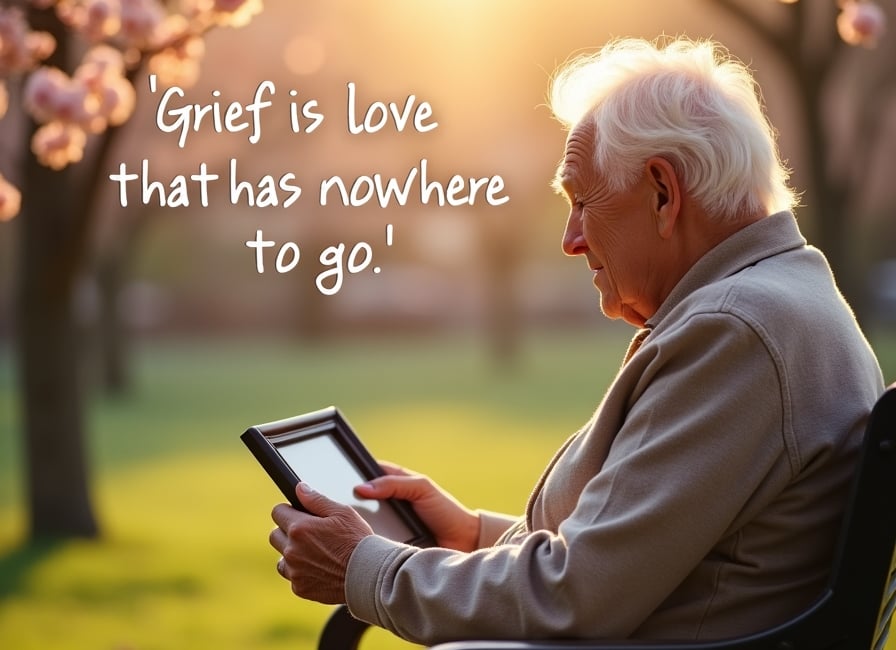Grief After Loss of a Spouse or Friends: Finding Strength Through Healing
Discover gentle ways to heal after the loss of a spouse or close friend. Learn about grief counseling, support groups, journaling, and building new connections to find comfort and hope again.
Javed Niamat
10/10/20254 min read


Grief After Loss of a Spouse or Friends: Finding Strength Through Healing
Losing a spouse or a close friend is one of the most painful experiences anyone can face—especially for older adults. It’s not just about losing someone you love; it’s about losing a part of your daily life, your routine, and often your sense of security.
This deep emotional wound can feel overwhelming, but healing is possible through support, connection, and self-compassion.
Understanding Grief in Seniors
Grief is a natural emotional response to loss. For seniors, this pain can be intensified because of shared decades, deep bonds, and a sense of identity intertwined with the person who has passed away.
Grief can affect every part of life:
Emotional: Sadness, anger, loneliness, confusion.
Physical: Fatigue, trouble sleeping, loss of appetite.
Mental: Difficulty concentrating, feeling disoriented.
Social: Isolation, withdrawal from friends and activities.
“Grief is the price we pay for love.” – Queen Elizabeth II
Recognizing that these feelings are valid and normal is the first step toward healing.
Why Grief Can Be Especially Hard for Seniors
Shared history: Losing a spouse or a lifelong friend means losing someone who knew your story intimately.
Changing identity: Many seniors struggle with their sense of purpose after loss.
Reduced support networks: Social circles often shrink with age.
Health impacts: Grief can lead to higher risks of depression, anxiety, and physical health decline if left unaddressed.
Research from the National Institute on Aging shows that grief can affect both emotional and physical well-being, and support plays a critical role in recovery.
Healthy Ways to Cope with Grief
Healing doesn’t mean forgetting. It means learning to live again while honoring the memory of your loved one.
Here are some powerful ways to begin the healing journey:
1. Grief Counseling
Speaking with a trained counselor or therapist can help seniors process emotions, learn coping skills, and navigate the waves of loss.
Professional counseling offers a safe space to express pain.
It can help prevent prolonged or complicated grief.
Many insurance plans and senior centers offer affordable or free options.
You can find grief counseling resources at GriefShare.
2. Support Groups
No one should grieve alone. Joining a group of people who understand the same pain can bring comfort and connection.
Support groups help reduce feelings of isolation.
They offer shared experiences, understanding, and hope.
Many groups meet in community centers, churches, or online.
Online support communities, like AARP Grief & Loss Resources, are especially helpful for those with mobility issues.
3. Journaling & Creative Expression
Writing can be a powerful healing tool.
Journaling emotions helps release pain and confusion.
Writing letters to your loved one can provide closure.
Creative activities like painting, crafting, or music can also bring comfort.
Tip: Start by writing just one line a day about how you feel — it can grow into a meaningful reflection.
4. Building New Social Connections
It’s natural to retreat during grief, but connection is a key part of healing.
Join clubs, senior centers, or faith-based groups.
Volunteer — helping others can bring renewed purpose.
Reconnect with old friends or family.
“The best way to honor those we’ve lost is to keep living fully.”
Rebuilding a sense of community can ease loneliness and give seniors a sense of belonging again.
Caring for Emotional and Physical Health
Grief affects both the mind and body. Taking care of your health is essential to healing:
Get enough rest. Even if sleep is hard, keep a consistent bedtime routine.
Eat nourishing foods. Good nutrition supports emotional stability.
Move gently. Walks, yoga, or tai chi can improve mood and reduce stress.
Seek spiritual support if faith is part of your life.
The Mayo Clinic notes that maintaining daily routines and healthy habits can ease symptoms of grief over time.
How Family and Friends Can Help
Support from loved ones can make a big difference for a grieving senior.
Here’s how family and friends can help:
Listen without judgment.
Encourage but don’t pressure — everyone grieves differently.
Offer practical help (meals, errands, companionship).
Check in regularly, even after the initial weeks of loss.
If you’re supporting someone through grief, patience and presence often mean more than perfect words.
When to Seek Professional Help
Grief is personal, but sometimes it can become overwhelming and may lead to depression or prolonged grief disorder.
Seek help if:
Sadness feels unbearable most of the time.
There’s no interest in daily activities for months.
Physical health declines rapidly.
Thoughts of self-harm arise.
Professional therapists, grief specialists, or a primary doctor can provide critical support.
In the U.S., you can call or text 988 Suicide & Crisis Lifeline for immediate help.
Finding Hope Beyond Grief
While grief never fully disappears, it evolves. Over time, the sharp pain softens into gentle remembrance. Many seniors find new meaning through community, volunteering, faith, or creative expression.
You are not alone.
Grief is a sign of love — and love never truly ends.
“Grief changes shape, but it never ends.” – Keanu Reeves
Whether it’s through support groups, journaling, or the warm embrace of family, there is a way forward. Healing is a journey — not a race.
Resources for Grief Support
GriefShare — Local and online support groups.
AARP Grief & Loss Resources — Articles, guides, and tools for seniors.
National Institute on Aging — Health resources for older adults.
988 Suicide & Crisis Lifeline — Free, 24/7 emotional support.
Final Words
Losing a spouse or close friend leaves a lasting mark on the heart. But with time, support, and care, it is possible to rebuild a meaningful life again.
Talk. Share. Remember. Heal.
If you or a loved one is struggling with grief, reach out — help is closer than you think.